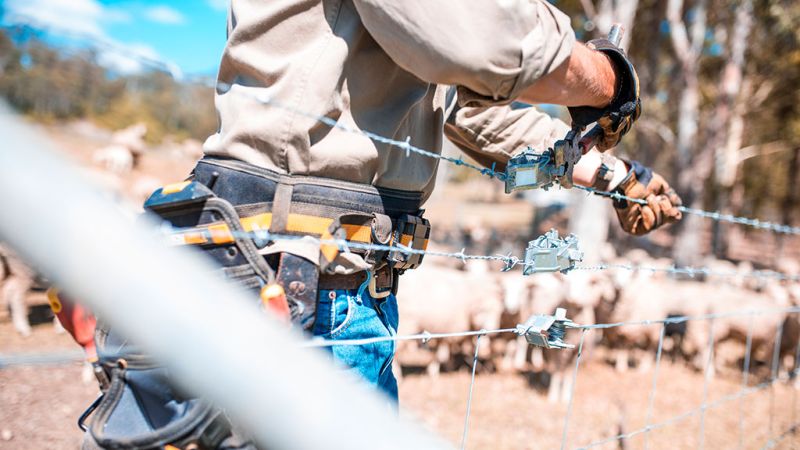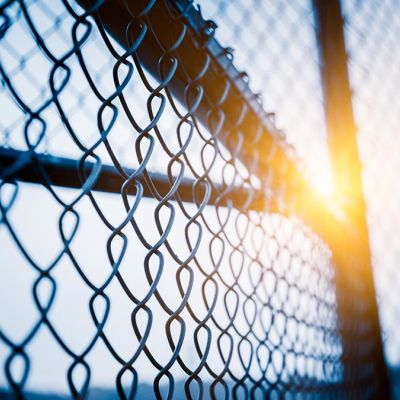WANT A GREAT DEAL?
Add products & we'll be in touch soon!


The Ultimate Guide to Wire Fencing Supplies
Types of Wire
Barbed Wire
Barbed wire is the traditional choice for rural properties. Its sharp points serve as an effective deterrent against both animals and potential intruders. It's durable, easy to install, and offers a high level of security. However, it's essential to handle it carefully to avoid injuries.
Chicken Wire
Chicken wire is the go-to option for poultry enclosures and small animal pens. It's lightweight, easy to manipulate, and relatively inexpensive. However, it's not the most robust option and may require additional reinforcement for added security.
Welded Wire
Welded wire fencing is a sturdy choice for gardens, dog kennels, and small animal enclosures. The wires are welded at each intersection, providing added strength and durability. It's also more aesthetically pleasing compared to other wire types.
Razor Wire
Razor wire is a high-security option that serves as an effective deterrent against human intruders. However, it's crucial to check local regulations before installing razor wire, as it may not be allowed in some areas.
Coated Wire
Coated wire is essentially metal wire covered with a layer of plastic or other synthetic material. This coating offers added protection against the elements, making it a durable choice for harsh climates.
Essential Tools
Wire Cutters
A robust pair of wire cutters is indispensable for any fencing project. Ensure they are strong enough to cut through the thickest wire you'll be using.
Fence Stretchers
Fence stretchers or tensioners are essential for applying the right amount of tension to the wire. This ensures that the fence remains taut and secure over time.
Post Driver
A post driver helps in installing fence posts efficiently. It ensures that the posts are evenly spaced and securely anchored into the ground.
Pliers
A good pair of pliers is useful for twisting and securing the wire, especially during the installation of barbed or razor wire.
Measuring Tape
Accurate measurements are crucial for a successful fencing project. A measuring tape will help you determine the amount of wire and the number of posts you'll need.
Gloves and Safety Gear
Safety should never be compromised. Always wear appropriate Personal Protective Equipment (PPE), such as gloves and eye protection, to prevent any injuries during the installation process.
Installation Tips
Plan Ahead
Proper planning is crucial for a successful fencing project. Sketch out your fence line, calculate the amount of wire and the number of posts you'll need, and make a list of all the tools and accessories required.
Safety First
Always prioritise safety. Wear appropriate PPE and ensure that you are well-versed in the handling of tools and materials.
Regular Maintenance
Regular inspection and maintenance are key to prolonging the life of your fence. Look out for signs of wear and tear, such as rust or loose wires, and address these issues promptly to maintain the fence's integrity.
Legal Considerations
Before you start your fencing project, it's essential to be aware of any local zoning laws rules that may apply. This can include restrictions on fence height, materials, and even colour.
Additional Considerations
Environmental Factors
When choosing your wire fencing supplies, it's crucial to consider the environmental conditions of your area. For instance, if you live in a region with high humidity, opting for rust-resistant materials can significantly extend the lifespan of your fence.
Budget Constraints
Wire fencing can be a cost-effective solution, but it's essential to budget for quality. Cheaper materials may save you money upfront but could cost you more in the long run due to frequent repairs and replacements.
Customisation Options
Wire fencing doesn't have to be purely functional; it can also be aesthetically pleasing. Many suppliers offer customisation options, such as different colours or decorative elements, allowing you to match the fence with the overall look of your property.
Customisation Options
While wire fencing installation can be a DIY project, it may be beneficial to consult or hire professionals for more complex setups. They can provide valuable insights into the best materials and installation techniques for your specific needs.
DIY vs Professional Installation
While wire fencing installation can be a DIY project, it may be beneficial to consult or hire professionals for more complex setups. They can provide valuable insights into the best materials and installation techniques for your specific needs.
Frequently Asked Questions
Can I Install a Wire Fence Myself?
Yes, wire fencing is one of the more straightforward fencing options to install. However, for larger or more complex projects, professional help is advised.
How Often Should I Inspect My Wire Fence?
Regular inspections are crucial for maintaining the integrity of your fence. A monthly check is generally sufficient for most residential properties, while farms and larger estates may require more frequent inspections.
What Is the Lifespan of a Wire Fence?
The lifespan of a wire fence can vary depending on several factors, including the quality of materials used, environmental conditions, and how well the fence is maintained. However, a well-installed and maintained wire fence can last for many years.
Final Thoughts
Choosing the right wire fencing supplies is not just about meeting immediate needs; it's also about ensuring long-term durability and effectiveness. From the type of wire and essential tools to installation tips and maintenance, every aspect plays a crucial role in the success of your fencing project. By investing time in planning and prioritising quality and safety, you can build a wire fence that not only meets but exceeds your expectations.
Don't compromise on quality; choose the best for your property and contact us at Direct Trades Supply for quality wire fencing products and advice.
Popular Articles

Company
123 Kelvin Road
Maddington WA 6109
P: 1300 123 387 (DTS)
E: sales@dtswa.com.au
Opening Hours
7:30 AM - 5:00 PM Mon-Fri
7:30 AM - 12:00 PM Sat
Closed Public Holidays












